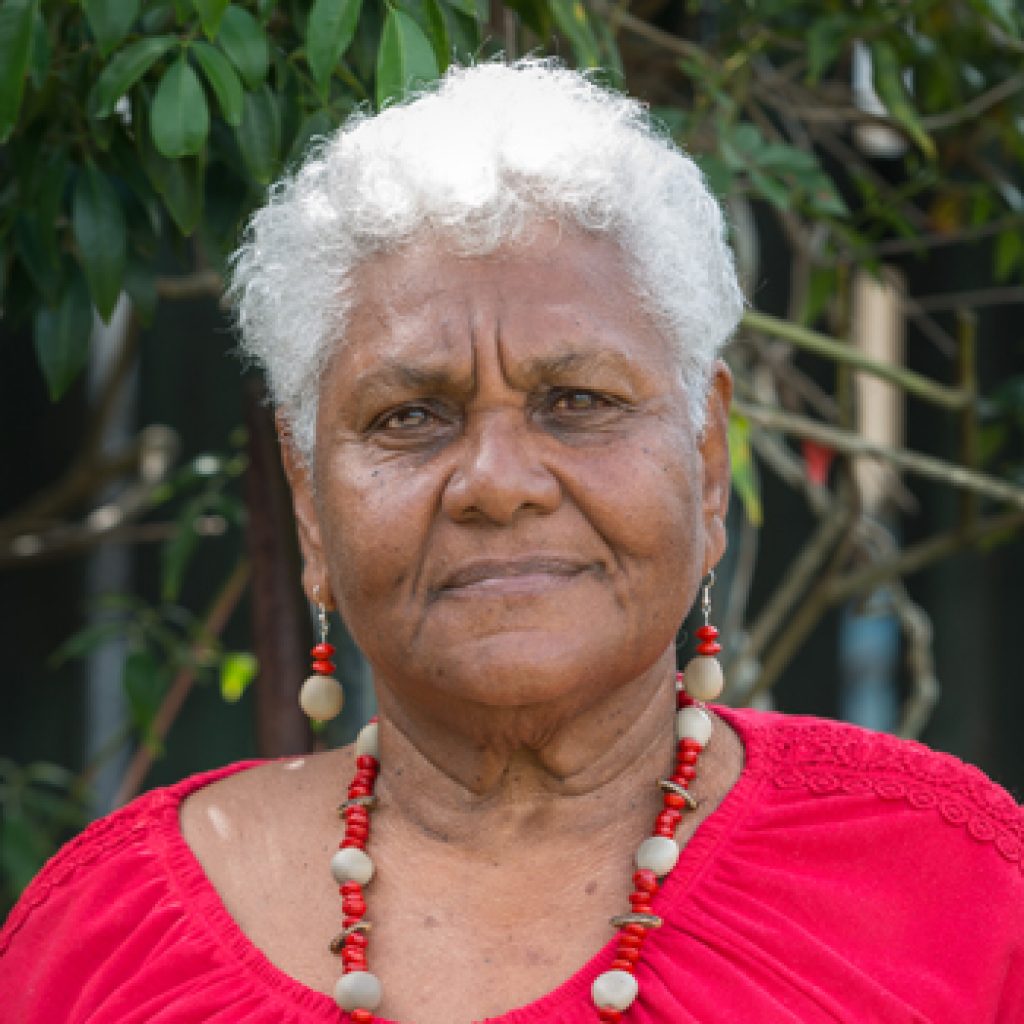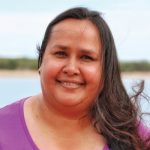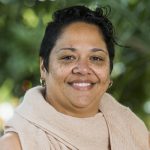
My message to Indigenous women this NAIDOC Week is to go to school and get educated. It’s about you, you as a woman. You as a female. Go out there and get educated go and get whatever you can for yourself.
I was born and raised in Cairns.
My Mother was born in Cairns and my Grandmother comes from Yarrabah on my Mum’s side. Her Dad came from Sri Lanka and my Dad is an African American, he came here during the war. I ended up marrying an African from Zimbabwe.
I grew up knowing only Aboriginal culture because my Grandfather died when I was around about ten years old. This meant that my Aboriginal Grandmother was there and she taught us everything that we knew, and everything we know now. She taught us how to share and care for each other and for the land and everything. I learned all that from my Grandmother.
Our whole family group lived in a bungalow reserve – we actually had heaps of extended family all around us. So, everybody got involved in Aboriginal culture.
I’ve been very active in the Cairns community for about 40 years. I’ve been slowed down by cancer in recent years, but still very passionate about the community.
My involvement in the community started off with a student support role at our local school. We were only paid for one hour a day but I was there all day because we wanted our children to be something and get somewhere.
This was all taking place in the mid-1970s, and at that time, our children weren’t achieving. They weren’t going anywhere and were dropping out at Year 8 or 9 at High School. So, I stayed at the school and worked with one of the teachers, who is my really good friend. She’s still my friend today – she’s a white lady actually.
So we worked with others to see if we could get the kids through to Year 12 and then onto University. My son was actually one of those students who went from that group and I’m proud to say that some of the other students went on to successful – some became solicitors and others became doctors. It is touching to know that it was because of myself and others who pushed for our kids to get somewhere.
I must have been at the school for around 4 or 5 years, and from there I went and I set up Boopa Werem Kindy. That Kindy is still going today and I ended up sitting on its Board for nine years. Around the same time, I was working with Indigenous Women’s Shelters. We saw that there were too many young girls experiencing violence, and those women who had children were struggling because those young girls didn’t have any parenting skills.
A couple of my really good friends that have passed on now, bless them – they are the ones who should be mentioned in all this, Debbie and Joe Morgan. Mr and Mrs Morgan were First Nation people and worked in the community to provide something better for our First Nation people. To make sure everyone gets a fair go.
They were tireless workers in this community. They were the ones who got us young ones to come and see what the problem were in our community and to help set up all these organisations. They pushed services like early childhood centres, Kindys, housing, and medical centres.
I’m really proud that I’ve done all this and it all was done without any pay. I managed a Women’s Shelter and became Chairperson for around 9 or 10 years.
Can I just say that the shelter was set up by Mr and Mrs Morgan – they used to get around the streets and give food out to all the homeless women. And we didn’t only take our First Nation women, we took Torres Strait Islanders, we took Filipinos, we took white ladies – we took whoever had the problem with Domestic and Family Violence, they were all welcome into our shelter.
When I started this with them, I’d just had my last child. We used to stay overnight and my husband used to bring my child over so I could breastfeed him and then he’d take him home again. We also used to buy all the food to feed those women out of our own pockets.
I want to acknowledge two women who were instrumental in getting this shelter established. There was a Maori lady, Eve Finney, and another lady, Yvonne Robert. They had a house that they were renting privately but ended up letting us use this for the Women’s Shelter. So with no funding, we relied on this gift and donations from other people to establish the shelter. And we weren’t rich people, we were just struggling people ourselves but we were taught to share.
We had that value of sharing instilled in us because First Nation people are loving, sharing and giving people – we give whatever we had to others. I grew up in a reserve and whatever you had you had to share with others, you know?
I even brought my children up like that. I’ve got four boys and they used to tell me at dinner time:
Hey Mum don’t put too much food out, we want to take some to the park for the homeless people.
And sure enough my kids would go down just before dark and give food to those in need, so my kids were doing that too. I’ve handed these values to my children – especially because at this time, you didn’t have shelters or things like that. This is the way it was taught to me by my Grandmother who was a strong First Nation woman from Yarrabah and she taught me that and she instilled that into me and I instilled that into my children and even today my children are still look at those people, who are worse off than us, and share with them.

How do you celebrate NAIDOC Week?
I go to all the free celebrations but it’s a bit disappointing to see all the focus on people who are getting paid in big jobs and saying that they’re doing this and doing that. You never see those silent people who plug away for their community.
We’ve got to recognise those people who built this foundation up for the young ones. People are forgetting about us Elders who’ve been building bridges for the young ones today. They’re not recognising us and we do feel invisible, but I we still attend events and celebrate the past.
We’re handing down what I learnt from my Grandmother, the sharing and caring and I’m handing it down to my niece and my children.
It’s about sharing and caring for other people and I’ve always said to my children:
You go out there and you get it. You want it, you get it. You’re just as good as that next white man next to you.
That’s what I instilled into my children and my children are doing it for their own children because we’ve got to get up and step up. As Aboriginal people, we’ve got to step up otherwise we’ll fall behind again. Because when I grew up, you’d go to the shop and you’d stand in the queue and they’d serve that white man before they serve us and I don’t want that to happen today. So now that’s why our kids are now stepping up and saying, we’re going to get good at it and get educated and we need to get that piece of paper to say, “yes we can compete against the next person, because we’re just as good them.”
Unfortunately I don’t see much being done for women at the moment. I’d love to see a parenting course rolled out to our community, and my niece Sarah is very much pushing for this. This was one of my dreams as we can’t blame kids for bad behaviour if their parents aren’t able to properly care for them.
That’s what I would like, to see more done for women in the sense of:
Come on, get it together, let’s work together and do something for your children.
If we could get women out of violent situations and just take them out to the beach or the movies or bring someone in to show them how to look after themselves, I think it would be better. Lots would be better in the home. And even just to cook a decent meal, have people come in and teach these women how to cook a proper meal. Take them shopping, how to look after their houses. It’s got to happen for the family to be whole again.
What message do you have for women this NAIDOC Week?
My message to Indigenous women this NAIDOC Week is to go to school and get educated.
I didn’t have any doors open for me growing up, so make sure you grab these opportunities with both hands. Don’t worry about having boyfriends and getting pregnant, that’s not what it’s all about.
It’s about you, you as a woman. You as a female. Go out there and get educated go and get whatever you can for yourself.


